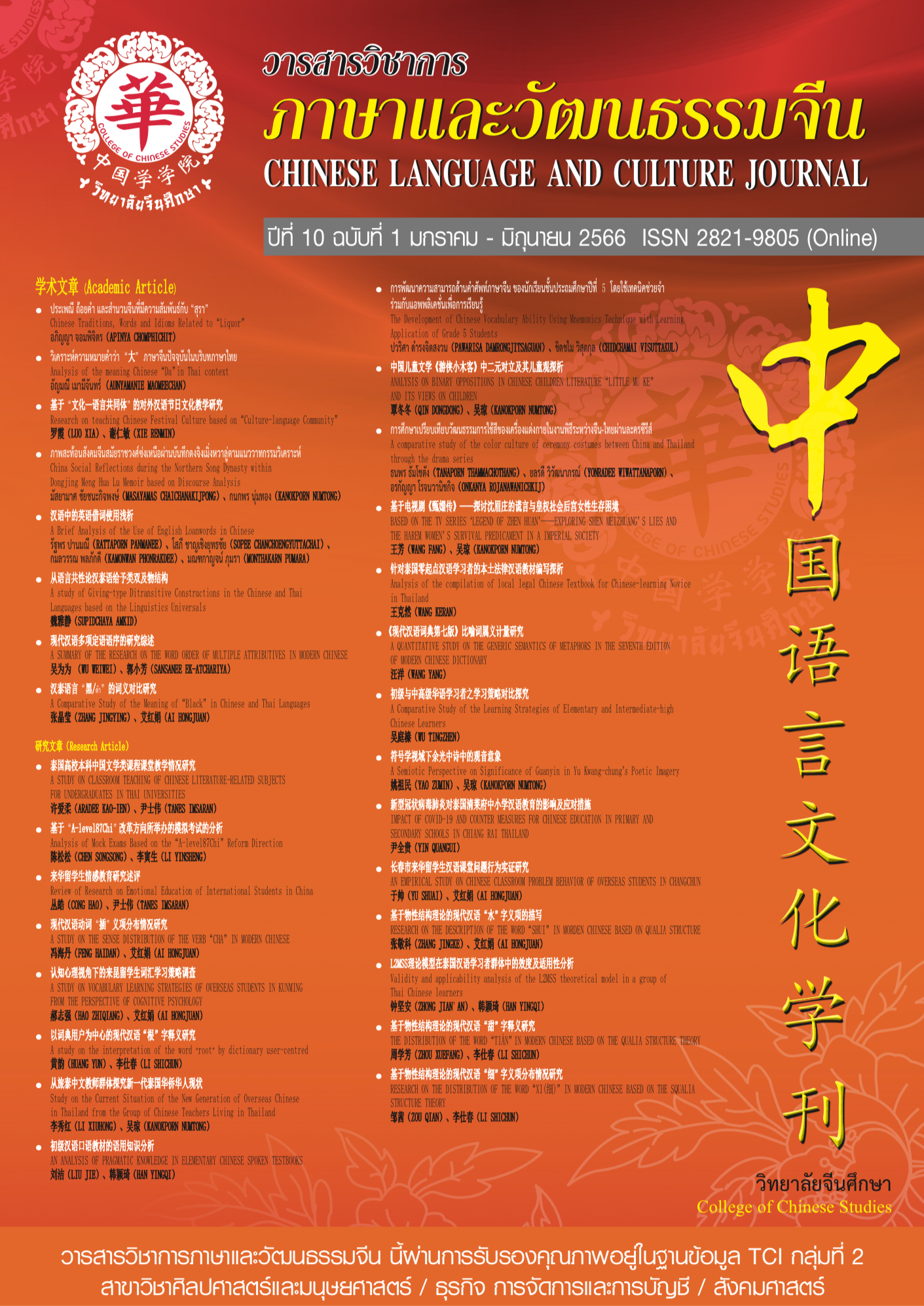AN ANALYSIS OF PRAGMATIC KNOWLEDGE IN ELEMENTARY CHINESE SPOKEN TESTBOOKS
Keywords:
elementary of Chinese spoken of textbooks, pragmatic knowledge, textbooks compilingAbstract
Based on theory of pragmatics, this article analyzes the types, frequencies and manners of pragmatic knowledge in three sets of elementary Chinese spoken textbooks. It is found that the main types of pragmatic knowledge presented in the elementary Chinese spoken textbooks are speech acts, contexts, conversational implicatures, politeness and conversation analysis, while the culture, deixis, and cooperative principle are not presented, which may be related to the level of the textbooks. Speech acts is dominant among all the pragmatic knowledge types in the elementary spoken language textbooks, which is because the current international Chinese textbooks are still compiled according to the outline of "structure-function-culture". The manners of pragmatic knowledge are relatively simple in the present textbooks, which mainly are examples and exercises, metapragmatic presentations should be paid attention to. From the results of quantitative analysis, it can be seen that the pragmatic knowledge in elementary Chinese spoken textbooks has the following problems: (1) the amount of pragmatic knowledge is insufficient; (2) it has not received enough attention from compilers and teachers;(3) the distribution of various pragmatic knowledge is unbalanced;(4) some pragmatic knowledge is not explained enough. Therefore we suggested: (1) to increase the amount of pragmatic knowledge and construct pragmatic knowledge as a whole; (2) to set up a pragmatic section and carry out meta-pragmatic descriptions, to combine multimedia to enrich the manners of pragmatic knowledge; (3) to increase the comparison of Chinese and foreign pragmatic knowledge; (4) to enhance the explanation of pragmatic knowledge, not only should consider "what it is", but also "how it is used".
References
陈新仁. 汉语语用学教程. [M]. 广州:暨南大学出版社,2017.
陈作宏. 第二语言汉语教学中语用知识的合理利用. [J]. 民族教育研究. 2004(01):67-72.
关颖. 从会话分析理论看对外汉语初级口语教材的会话编写. [D]. 陕西师范大学硕士学位论文,2007.
何自然、冉永平. 新编语用学概论. [M]. 北京:北京大学出版社,2009.
何兆熊. 新编语用学概要. [M]. 上海:上海外语出版社,1999.
姜占好、陶源. 国内外教材中的语用知识研究述评. [J]. 淮北师范大学学报(哲学社会科学版). 2013(04):23-26.
李同. 《新实用汉语课本》言语行为分布分析. [D]. 暨南大学硕士学位论文,2011.
李民、余中秋. 中外英语教材中的语用知识对比研究. [J]. 现代外语,2020(06):806-817.
马苏阳. 国际中文教材中语用知识编排研究——以三套口语教材为例. [J]. 出版广角,2015(13):
-88.
孟妹. 教材的语用评估: 个案研究. [D]. 东北财经大学. 2006.
王文龙. 汉语口语教材中会话对答结构类型的表现分析. [J]. 华文教学与研究,2013(04):65-74.
杨恬. 汉语口语教材中含意知识的呈现. [J]. 海外华文教育. 2014(04): 440.
杨恬. 对外汉语中级口语教材的会话结构及其语用功能研究. [J]. 现代语文,2015(06):145.
张英. 语用与文化——兼析日本汉语教材. [J]. 汉语学习,2000(03):50-56.
Meier, A. Posting the banns: A marriage of pragmatics and culture in foreign and second
language pedagogy and beyond. In A. Martínez⁃Flor, E. Usó⁃Juan & A. Fernández⁃Guerra
(eds.). Pragmatic Competence and Foreign Language Teaching. [J]. Spain: Castellón: University Jaume I. 2003: 120-185.
Vellenga, H.Learning pragmatics from ESL & EFL textbooks: How likely? [J]. TESL⁃EJ 2004. 8, (2): 1-18.
Ren, W. & Z. Han. The representation of pragmatic knowledge in recent ELT textbooks. ELT Journal. [J]. 2016. 70(4): 424⁃434.
Downloads
Published
How to Cite
Issue
Section
License
Copyright (c) 2023 Chinese Language and Culture Journal

This work is licensed under a Creative Commons Attribution-NonCommercial-NoDerivatives 4.0 International License.
บทความที่ได้รับการตีพิมพ์เป็นลิขสิทธิ์ของวารสารภาษาและวัฒนธรรมจีน มหาวิทยาลัยหัวเฉียวเฉลิมพระเกียรติ
บทความใน “วารสารวิชาการภาษาและวัฒนธรรมจีน” เป็นทรรศนะของผู้เขียนโดยเฉพาะ กองบรรณาธิการไม่มีส่วนในความคิดเห็นในข้อเขียนเหล่านั้น




